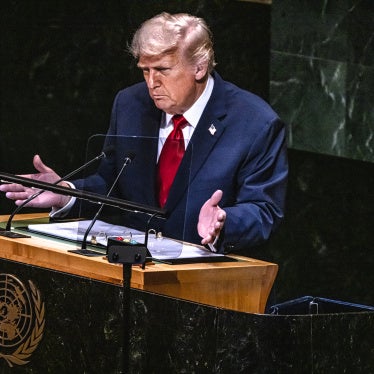Some 20 years ago this month, a brutal war exacerbated by ethnic divisions broke out in Bosnia and Herzegovina. To end the war, the European Union and the United States, among others, helped broker the Dayton Peace Accords and wrote the country's new constitution, putting the former warring factions - Bosniaks, Croats and Serbs - on an equal footing to help resolve the tensions that fuelled the conflict. Whatever its short-term benefits in bringing peace, the constitution has not been the promised cure-all for ethnic divisions. Instead, it has helped to entrench ethnic politics and legitimised blatant discrimination against Bosnia's minorities - including Roma and Jews - undermining Bosnia's many commitments to protect their human rights.
The constitution prevents minorities, which it refers to as "others", from holding the highest political offices such as the presidency or a seat in one of the two legislative chambers. These are reserved for the three main ethnic groups - those same Bosniaks, Croats, and Serbs. Minorities are also prevented from obtaining many civil service jobs in municipalities and cantons throughout the country. For many, particularly the Roma people, discrimination in political and public life reinforces the discrimination they face when trying to access the basic public services on which so many of them depend. In 2009, the European Court of Human Rights found the discrimination against minorities in the constitution violated human rights laws, adding to the need for urgent reform.
But little progress has been made since that judgment. The October 2010 elections were held under the existing constitution, barring access to high office for minority candidates. The newly formed government in Bosnia, delayed by wrangling among the main groups for more than a year, has taken few steps to remedy the problem. The challenge of seemingly intractable discrimination against minorities in Bosnia, however, presents an opportunity for Brussels, Washington and the other international actors that wrote the Bosnian constitution. They should help Bosnians fashion a new political framework based on non-discrimination and respect for human rights.
The EU, which retains substantial influence on Bosnian politics because of the potential of Bosnia's accession to the union, has wisely conditioned the start of membership negotiations on constitutional reforms that end discrimination based on ethnicity in Bosnia. This policy has pushed Bosnia's politicians to consider fundamental reforms, many of which would challenge the system of ethnically based politics. But the EU has not followed its condition with sufficient actions to ensure adequate reform. Europe has declined to provide guidance to Bosnia's political leaders about which changes would adequately address discrimination against minorities – instead, citing the need for Bosnians to sort the constitution out for themselves.
The EU is also assisting in the preparation of Bosnia's first census since 1991. It is vital for this census to respect the rights of everyone to either freely declare or decline to declare themselves as members of ethnic or religious groups. The term "other" should not be used. Nor should the census encourage the ongoing division of Bosnia into three main groups and "others", in figures. Specific attention is needed to ensure the full inclusion of the Roma. Without clear guidance from the EU and other expert players, there is a real risk that Bosnia will pass changes that fail to fully address discrimination against minorities and continue to perpetuate ethnic separation; and that the EU will accept these changes despite their inadequacy. Bosnia's politicians have a legal obligation to end the ethnic discrimination that the Bosnian constitution perpetuates. Europe, which helped broker that constitution and has the influence to guide Bosnia in the right direction, has both the expertise and a moral obligation to help.
Amanda McRae is a consultant for Human Rights Watch and author of the report Second class citizens: discrimination against Roma, Jews, and other national minorities in Bosnia and Herzegovina






